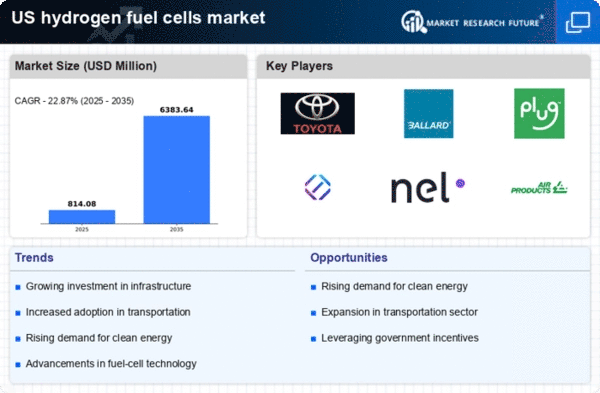Rising Environmental Concerns
The hydrogen fuel-cells market is experiencing a surge in interest due to increasing environmental concerns. As climate change becomes a pressing issue, stakeholders are seeking cleaner alternatives to fossil fuels. Hydrogen fuel cells, which emit only water vapor as a byproduct, present a viable solution. In the US, the transportation sector is a significant contributor to greenhouse gas emissions, accounting for approximately 29% of total emissions. The shift towards hydrogen fuel cells is seen as a critical step in reducing this impact. Furthermore, the hydrogen fuel-cells market is projected to grow as consumers and businesses alike prioritize sustainability. This trend is likely to drive investments in hydrogen technologies, thereby enhancing the overall market landscape.
Government Policies and Incentives
Government policies and incentives are crucial drivers of the hydrogen fuel-cells market. The US government has implemented various initiatives aimed at promoting hydrogen technologies, including tax credits and grants for research and development. These policies are designed to stimulate innovation and reduce the financial barriers associated with adopting hydrogen fuel cells. For example, the Hydrogen and Fuel Cell Technologies Office has allocated substantial funding to support projects that advance hydrogen production and utilization. Such government backing is likely to enhance market confidence and encourage private sector investment, thereby accelerating the growth of the hydrogen fuel-cells market.
Advancements in Fuel Cell Technology
Technological innovations are playing a pivotal role in the hydrogen fuel-cells market. Recent advancements in fuel cell efficiency and durability are making hydrogen solutions more attractive for various applications, including transportation and stationary power generation. For instance, the development of proton exchange membrane fuel cells (PEMFCs) has improved performance metrics, leading to a potential increase in market adoption. The US Department of Energy has set ambitious targets for fuel cell efficiency, aiming for a 50% reduction in costs by 2030. This focus on innovation is likely to enhance the competitiveness of hydrogen fuel cells against traditional energy sources, thereby expanding the market's reach.
Investment in Renewable Energy Sources
The hydrogen fuel-cells market is benefiting from a broader investment trend in renewable energy sources. As the US transitions towards a more sustainable energy grid, hydrogen is increasingly viewed as a key component of this strategy. The integration of hydrogen production with renewable energy sources, such as wind and solar, is gaining traction. This synergy not only enhances energy security but also reduces reliance on fossil fuels. According to recent estimates, the US could see a 30% increase in hydrogen production capacity by 2030, driven by investments in renewable technologies. This growth is expected to bolster the hydrogen fuel-cells market, making it a more viable option for energy consumers.
Growing Demand for Clean Transportation Solutions
The hydrogen fuel-cells market is witnessing a growing demand for clean transportation solutions. As urban areas grapple with air quality issues, there is an increasing push for zero-emission vehicles. Hydrogen fuel cell vehicles (FCVs) are emerging as a promising alternative to battery electric vehicles (BEVs), particularly for heavy-duty applications. The US market for FCVs is projected to expand significantly, with estimates suggesting a potential market size of $20 billion by 2030. This demand is driven by both consumer preferences and regulatory pressures aimed at reducing emissions. Consequently, the hydrogen fuel-cells market is likely to benefit from this shift towards cleaner transportation options.

















